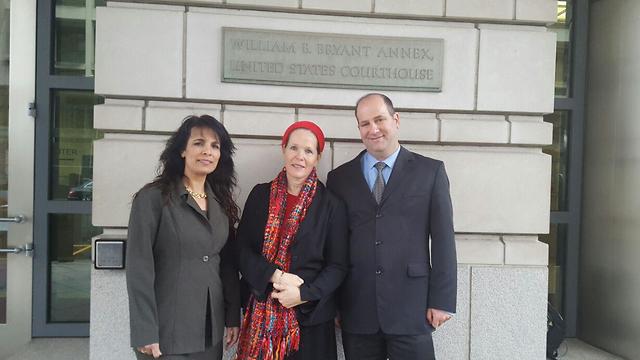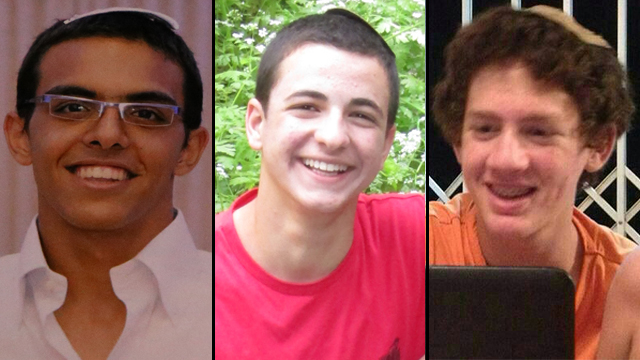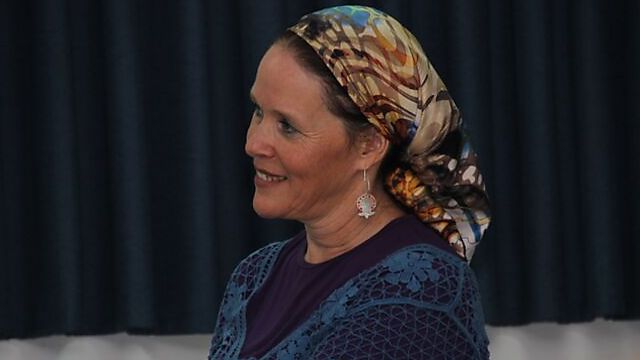
US court blames murdered teen's family for living in territories
Family of Naftali Frenkel, who was kidnapped and murdered by Hamas terrorists along with two other teens, files lawsuit against Iran and Syria for allegedly supplying money to the terrorists who carried out the attack; court awards them small amount of damages, explaining family took its chances when it chose to live beyond the Green Line and sending its son to a school near Hebron.
Now, a year and a half later, Ynet has obtained the court ruling in the lawsuit filed by the Frenkel family against Iran and Syria in a bid to hold them accountable for Naftali's murder.
The American court accepted the family's claims, but chose to award them a very small amount in compensation, arguing that the family had taken its chances when it chose to live in the West Bank.
The original verdict, handed down in March 2017, recognized the Frenkel family's right to sue Iran and Syria for their son's murder as American citizens. "The death of Naftali Frenkel was a tragic event for which money can never compensate his family," Federal Judge Rosemary Mayers Collyer.
"Iran and Syria did provide material support and resources to Hamas in Israel, which contributed to the hostage taking and murder of Naftali Frenkel," the judge ruled and ordered the defendants to pay $4.1 million in damages although the family sought damages of $340 million.
The Frenkel family appealed the amount of damages, which it wouldn’t have received in any event due to Syria and Iran's refusal to respond to the legal proceeding. The judge refused to reconsider her decision, stating that the plaintiffs had taken the risk involved in living beyond the Green Line in Israel and sending Naftali Frenkel a further 40 kilometers into the West Bank to a school in Gush Etzion, 6 kilometers from the city of Hebron.
In an attempt to explain the decision to award the family a relatively small sum compared to similar claims filed in the past, the judge said that Naftali Frenkel and the two other teens were kidnapped and murdered for being Jewish and Israeli teens. She stressed that Naftali wasn't selected because he was an American citizen who accidentally got involved in the conflict. On the contrary, she said, Hamas saw him as a target because of his Israeli citizenship.
The judge clarified that while these facts won't alleviate the plaintiffs' grief or loss, they do affect the remedy they are entitled to in terms of civil damages.
Naftali's mother, Racheli, was shocked by the judge's comment. "This is unthinkable," she said. "The children were on their way home from school. How can the teens be responsible for their own death?"
The family members turned to the United States courts of appeals together with attorneys Nitsana Darshan-Leitner and Robert Tolchin, claiming that the court overstepped its authority and involved unlawful considerations in its decision on the amount of damages.

About a month ago, the court accepted most of the family's claims and handed the case back to Judge Collyer, clarifying that no guilt should be ascribed to the victim and that the damages should be increased. Collyer is expected to make a decision on the matter soon.
"We filed the claim to 'irritate the bad guys,'" Racheli Frenkel explained. "There are many ways to fight terror, and in this case we are trying to put financial obstacles in their way. Even if a large sum of money is awarded, no one will enforce the ruling. We don't actually expect to receive the money."
Frenkel referred to the original ruling as "outrageous," adding that "the boys were on their way home from school. Does that make it okay to kill them?"
Attorney Nitsana Darshan-Leitner said, "We are glad that the court of appeals ruled that Naftali shouldn’t have expected to be murdered by Palestinian terrorists because he studied beyond the Green Line. The statement that the Frenkel family took the risk of being kidnapped and murdered because of their place of residence justifies terrorism and violence against innocent civilians. Moreover, when such a statement is issued by a court—alongside a financial reward to Palestinian terrorists—it may encourage further acts of terror, in Israel and worldwide."
"This is a case of blaming the victim," Racheli Frenkel told Ynet on Tuesday.
"The appeals court said this was outrageous," she said. "We are trying to manage these things logically rather than emotionally, but it's infuriating. The judge said we live in the territories, so we are partly guilty. We live several minutes from Latrun (in the community of Nof Ayalon within the Green Line), but that doesn’t matter. If I lived in Elkana, would it mean it's okay to murder me?
"We sued Iran and Syria because we had solid intelligence reports that the money that funded that terrorism came from Iran, went through Gaza and reached Hebron. No one disputed the intelligence part. They accepted Iran and Syria's accountability. Then the legal path moved to the damages issue. You have to prove that you're miserable after losing your son and that your life has been affected. That's a difficult ordeal. So we went there and opened all our wounds.
"It's not that (Iranian Supreme Leader Ali) Khamenei will come to our house with a check and say, 'Oops, I'm sorry, I didn't mean to fund terrorism.' The idea is to put financial obstacles in the terror organizations' way so that they won't have a free economy and won't be able to trade with terrorism in the stock exchange, like they have done in previous years and do what they want. The goal of these trials is to make their life difficult. The judge said outrageous things, we appealed, and the higher court said she was wrong."













